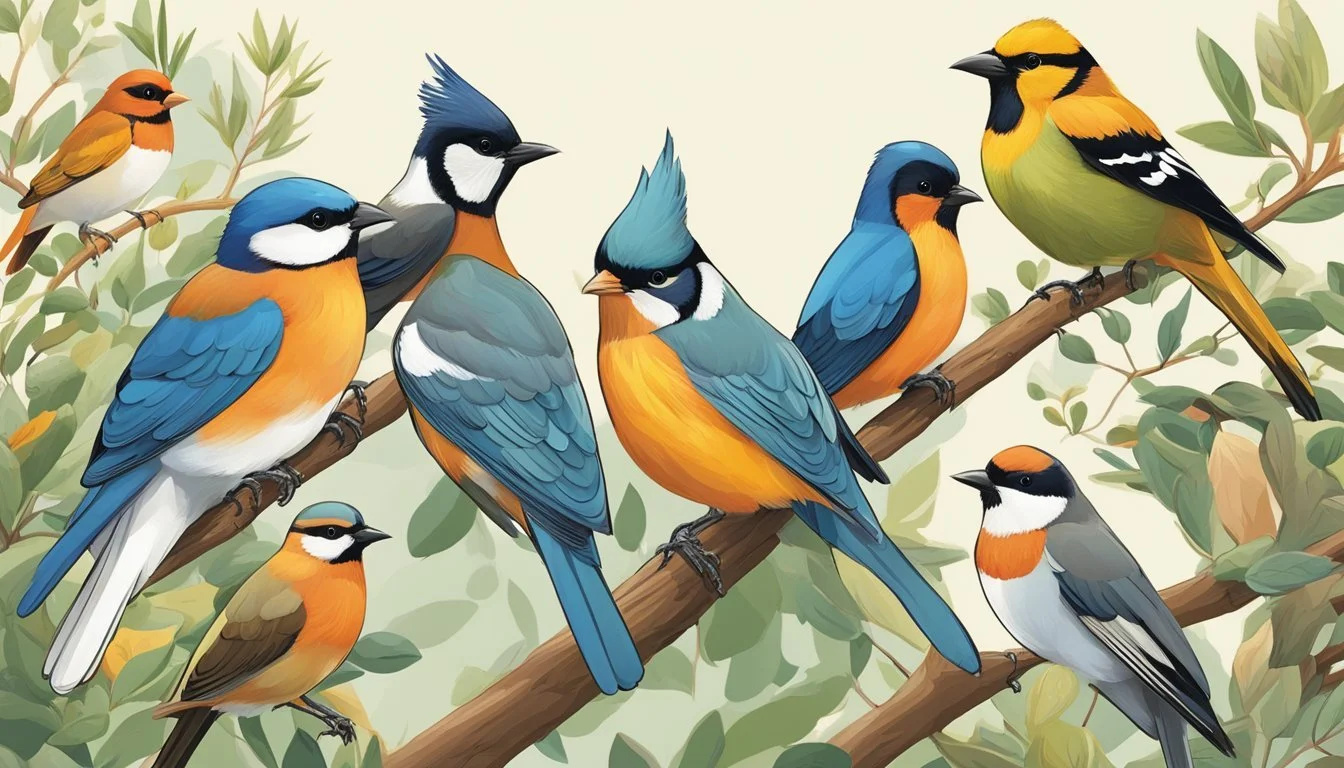Which Bird Personality Type Are You? Discover the Shocking Truth About Yourself!
Bird personality tests offer a unique and engaging way to explore human behavior and characteristics. These assessments categorize individuals into four distinct avian types, each representing different personality traits and tendencies. The four bird personalities - dove, owl, peacock, and eagle - provide insights into how people handle relationships, emotions, communication, and conflict.
The DOPE (Dove, Owl, Peacock, Eagle) test, created by Richard M. Stephenson, has gained popularity for its simplicity and memorable approach. This quick self-assessment tool helps individuals discover their basic personality type through a series of multiple-choice questions. By identifying with a specific bird, people can gain valuable insights into their strengths, weaknesses, and potential areas for personal growth.
Understanding one's bird personality type can lead to improved self-awareness and better interpersonal relationships. The dove represents peace and loyalty, the owl embodies wisdom and analysis, the peacock symbolizes confidence and expressiveness, while the eagle signifies leadership and decisiveness. By recognizing these traits in themselves and others, individuals can enhance their communication skills and adapt their approach in various personal and professional situations.
Understanding Bird Personality Types
Bird personality types offer a simplified framework for understanding human behavior and characteristics. This system categorizes individuals into four distinct avian archetypes, each representing unique traits and tendencies.
Historical Background of Bird Personality Framework
The bird personality framework draws inspiration from earlier psychological models. Dr. William Marston's DISC theory, developed in the 1920s, laid the groundwork for this approach. Marston identified four behavioral styles: Dominance, Influence, Steadiness, and Compliance.
Over time, these concepts evolved into the more accessible and memorable bird-themed system. This adaptation made personality assessment more engaging and relatable for a wider audience. The bird metaphor helps individuals quickly grasp and remember their personality type.
The Four Bird Personality Types
The bird personality system consists of four distinct types: Eagle, Peacock, Dove, and Owl. Each type represents a unique set of characteristics and behavioral tendencies.
Eagle: Natural leaders, confident and goal-oriented
Peacock: Outgoing, enthusiastic, and social
Dove: Calm, supportive, and harmonious
Owl: Analytical, detail-oriented, and methodical
These bird types align with the DISC model:
Bird Type DISC Equivalent Eagle Dominance Peacock Influence Dove Steadiness Owl Compliance
Traits of Each Bird Type
Eagles are assertive and results-driven. They excel in leadership roles and thrive on challenges. Eagles make quick decisions and focus on achieving goals efficiently.
Peacocks are charismatic and enthusiastic. They enjoy social interactions and excel in communication. Peacocks are creative problem-solvers and natural entertainers.
Doves prioritize harmony and cooperation. They are empathetic listeners and skilled mediators. Doves excel in supportive roles and create a calm work environment.
Owls are analytical and detail-oriented. They value accuracy and logical thinking. Owls excel in research, planning, and quality control roles.
Understanding these traits enhances self-awareness and improves interpersonal relationships. It allows individuals to leverage their strengths and adapt their communication style to work effectively with others.
Bird Personality Tests and Assessments
Bird personality tests offer a unique approach to understanding human behavior and traits. These assessments use avian metaphors to categorize individuals into distinct personality types, providing insights for personal growth and improved interpersonal interactions.
Comparing Bird Personality Test and Myers-Briggs
The Bird Personality Test and Myers-Briggs Type Indicator (MBTI) both aim to classify individuals into personality types, but differ in approach and complexity. The Bird test uses four avian categories - dove, owl, peacock, and eagle - each representing specific traits and tendencies.
MBTI, in contrast, employs 16 personality types based on four dichotomies. While MBTI offers more nuanced results, the Bird test's simplicity makes it easier to remember and apply in daily life.
Both assessments can enhance self-awareness and improve communication skills. The Bird test's visual metaphors may resonate more with some individuals, while MBTI's detailed profiles appeal to those seeking in-depth analysis.
Using DOPE Bird Personality Test
The DOPE (Dove, Owl, Peacock, Eagle) Bird Personality Test is a quick and accessible tool for self-assessment. Participants answer a series of questions about their behaviors, preferences, and reactions in various situations.
Based on responses, individuals are categorized into one of the four bird types:
Dove: Peaceful, harmonious, supportive
Owl: Analytical, logical, detail-oriented
Peacock: Outgoing, enthusiastic, creative
Eagle: Decisive, goal-oriented, confident
This test can be particularly useful in team-building exercises, career development, and personal growth initiatives. Its simplicity allows for easy application in diverse settings, from corporate environments to educational institutions.
Interpreting Your Bird Personality Test Results
Interpreting Bird Personality Test results involves understanding the characteristics associated with each avian type. It's crucial to approach these results as insights rather than definitive labels.
Key points to consider when interpreting results:
Recognize strengths and potential areas for growth
Understand how your type interacts with others
Apply insights to improve communication and relationships
Remember that most individuals exhibit traits from multiple bird types. The dominant type simply indicates stronger tendencies in certain areas. Use these results as a starting point for self-reflection and personal development.
Applying test insights can lead to improved self-awareness, better team dynamics, and more effective communication strategies in both personal and professional contexts.
Applications of Bird Personality Types
Bird personality types offer insights into human behavior and can be applied in various settings. These frameworks help individuals understand themselves and others better, improving interactions and outcomes.
In the Workplace
Bird personality types enhance team dynamics and leadership effectiveness. Eagles, with their decisive nature, often excel in management roles. They set clear goals and drive projects forward. Owls bring analytical skills, excelling in problem-solving and strategic planning.
Peacocks thrive in roles requiring charisma and creativity. Their outgoing nature makes them natural networkers and presenters. Doves foster harmony in the workplace, making them valuable in human resources or mediation roles.
Understanding these types helps managers assign tasks more effectively. It also improves communication between team members with different styles. For example, an Owl might need to present data more concisely when reporting to an Eagle.
In Personal Development
Self-awareness is key to personal growth. Identifying one's bird type can reveal strengths to leverage and areas for improvement. Eagles might focus on developing patience and listening skills. Doves could work on assertiveness and decision-making.
Peacocks benefit from honing their follow-through abilities. Owls may need to practice expressing emotions and connecting with others. This framework provides a starting point for targeted self-improvement efforts.
It also aids in understanding and improving relationships. Recognizing a partner's bird type can lead to better communication and conflict resolution. For instance, a Dove might learn to be more direct when dealing with an Eagle.
In Educational Settings
Teachers can use bird personality types to tailor their instruction methods. For Eagle students, setting clear goals and challenges can boost engagement. Owl learners might prefer in-depth explanations and independent study time.
Peacock students often thrive with group projects and presentations. Doves may excel in cooperative learning environments. Adapting teaching styles to match student personalities can improve learning outcomes.
This framework also helps students understand their own learning preferences. It can guide them in choosing study methods that align with their natural tendencies. Additionally, it prepares them for future workplace dynamics by fostering an understanding of diverse personality types.
Understanding Self and Others
Self-awareness and emotional intelligence play crucial roles in personal growth and building effective relationships. Recognizing personality types can provide valuable insights into social dynamics and individual behaviors.
Enhancing Emotional Intelligence
Emotional intelligence involves recognizing and managing one's own emotions while understanding those of others. The bird personality types offer a framework for developing this skill. Eagles, known for their assertiveness, can learn to temper their directness with empathy. Doves, naturally empathetic, might focus on strengthening their self-assertion.
Owls can use their analytical skills to decode emotional cues, while peacocks can channel their expressiveness to connect more deeply with others. By identifying their type, individuals can target areas for improvement in emotional recognition and regulation.
Improving Relationship Dynamics
Understanding bird personality types can significantly enhance interpersonal interactions. Doves and peacocks often form strong bonds due to their shared focus on emotions and relationships. Eagles and owls may connect through their task-oriented approaches.
Recognizing these patterns allows for better communication and conflict resolution. An eagle might learn to soften their approach when dealing with a sensitive dove. An owl could practice patience with a sociable peacock's need for interaction.
Introverted types (often owls and doves) can learn to navigate social situations more comfortably by understanding extroverted behaviors of eagles and peacocks.
Personality Types in Social Contexts
Bird personality types manifest differently in various social settings. In professional environments, eagles often take leadership roles, while owls excel in analysis and planning. Peacocks thrive in team-building and client relations, and doves contribute to harmonious work cultures.
Understanding these tendencies can help in team composition and task allocation. For example, pairing an eagle's drive with an owl's attention to detail can lead to effective project management.
In personal relationships, awareness of personality types can foster mutual understanding and appreciation of differences. It helps partners recognize each other's needs and communication styles, leading to more fulfilling connections.
Criticism and Limitations of Bird Personality Framework
The bird personality framework faces several challenges in its application and validity. Critics raise concerns about its scientific basis, potential for oversimplification, and cultural relevance.
Scientific Scrutiny and Skepticism
Researchers question the empirical foundation of bird personality types. Limited peer-reviewed studies support the model's efficacy in predicting human behavior or outcomes.
The framework lacks rigorous psychological research to validate its claims. Critics argue that the bird metaphors, while appealing, may not accurately represent complex human personalities.
Psychologists emphasize the need for more robust statistical analysis and longitudinal studies to establish the reliability and validity of bird personality assessments.
The Risk of Oversimplification
Categorizing individuals into four distinct types may oversimplify the complexity of human personalities. People often exhibit traits from multiple bird types, making clear-cut classifications challenging.
The framework might encourage stereotyping or pigeonholing, potentially limiting personal growth and self-perception. Critics argue that personality is fluid and context-dependent, not easily reducible to fixed categories.
Overreliance on bird types could lead to overlooking important individual nuances and experiences that shape behavior and decision-making.
Cultural and Individual Differences
The bird personality framework may not account for cultural variations in personality expression and interpretation. What's considered assertive (Eagle-like) behavior in one culture might be perceived differently in another.
Individual life experiences, upbringing, and environmental factors play significant roles in shaping personalities, which the bird framework might not fully capture.
Critics argue that the model's Western-centric approach may limit its applicability across diverse global populations. The symbolic meanings associated with different birds can vary widely between cultures, potentially affecting the framework's universal relevance.
Conclusion
The bird personality types offer a unique lens through which to view human behavior and traits. Eagles, doves, owls, and peacocks each represent distinct characteristics that individuals may identify with.
This simple yet memorable framework can provide insights into communication styles, leadership tendencies, and personal strengths. Understanding one's bird type may foster self-awareness and improve interpersonal relationships.
While no personality test is definitive, the bird typology serves as an accessible starting point for exploring individual differences. It encourages reflection on one's natural inclinations and potential areas for growth.
Ultimately, people are complex and multifaceted. The bird personality types offer a playful and relatable way to discuss human diversity, without oversimplifying the richness of individual personalities.


